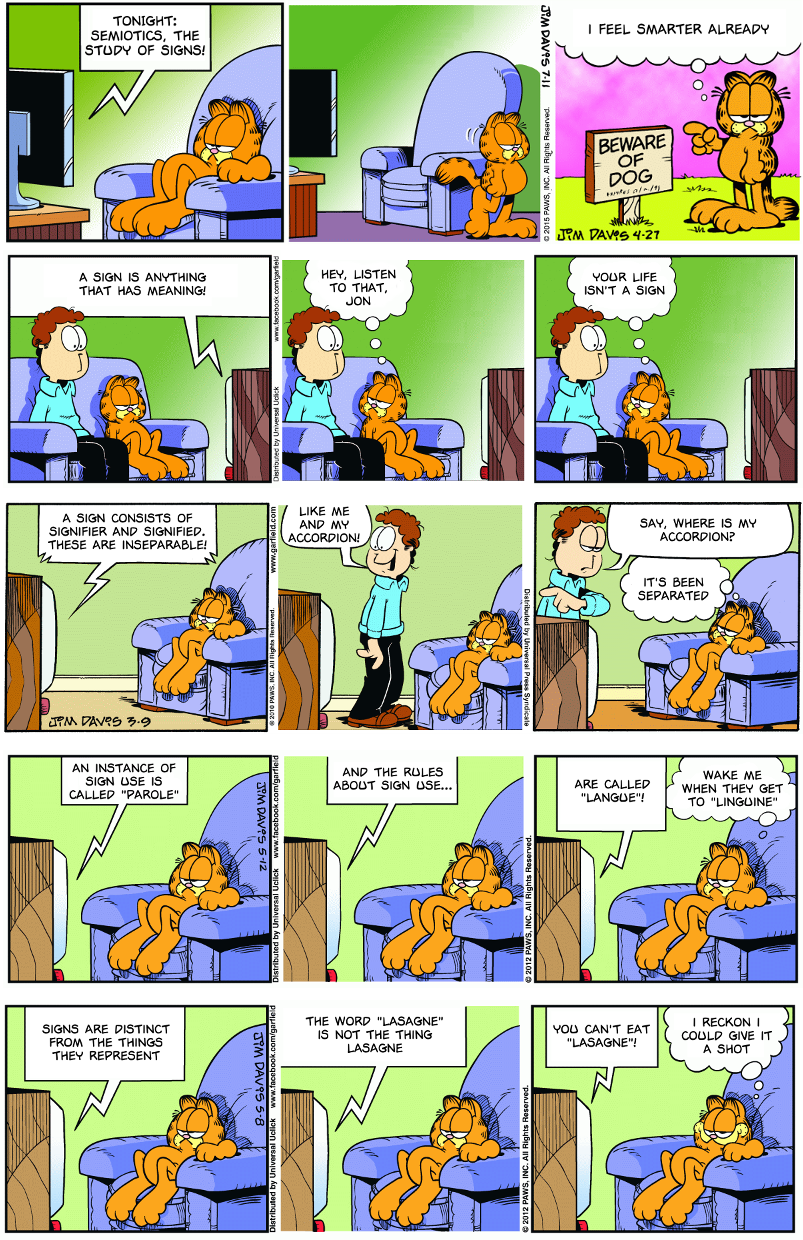» About » Archive » Submit » Authors » Search » Random » Specials » Statistics » Forum » RSS Feed Updates Daily
No. 3520: Linguistics with Garfield
First | Previous | 2019-01-07 | Next | Latest

First | Previous | 2019-01-07 | Next | Latest
Permanent URL: https://mezzacotta.net/garfield/?comic=3520
Strip by: Manyhills
TV: Tonight: semiotics, the study of signs!
{Garfield gets down from his chair}
{Garfield is looking at a BEWARE OF DOG sign}
Garfield: I feel smarter already
TV: A sign is anything that has meaning!
Garfield: Hey, listen to that, Jon
Garfield: Your life isn't a sign
TV: A sign consists of signifier and signified. These are inseparable!
Jon: Like me and my accordion!
Jon: Say, where is my accordion?
Garfield: It's been separated
TV: An instance of sign use is called "parole"
TV: And the rules about sign use...
TV: ...are called "langue"!
Garfield: Wake me when they get to "linguine"
TV: Signs are distinct from the things they represent
TV: The word "lasagne" is not the thing lasagne
TV: You can't eat "lasagne"!
Garfield: I reckon I could give it a shot
The author writes:
"Edutainment" is a fusty word, but even in this modern era comics aim to teach us things - IWC #1946 stopped me in my tracks with the obvious-but-not-obvious fact that the Appalachians and the Scottish Highlands are parts of the same range, and experts predict that by 2025 there will be no Wikipedia article that will not have been used as the basis for an xkcd. By contrast, though Jim Davis's work promoting education is laudable, pedagogy is rarely a concern for the strip Garfield. After writing the annotation to #1436, I decided to explore this missed possibility; the above five strips are me trying to communicate a few basic ideas in semiotics while still, crucially, producing something that could realistically run in newspapers.
Incidentally, the message of the last strip - that signs are distinct from their referents - might seem obvious to you, but it isn't to everyone. In her paper "The child's learning of English morphology", Jean Berko writes that young children often say that birthdays are called "birthdays" because you get presents, or that Thanksgiving is so called because you eat turkey.
The part of that paper that makes it so titanically important to the history of linguistics, however, is - to bring us full circle - Berko's own cartoon creation: the wug.
Original strips: 1999-04-27, 2010-03-09, 2010-03-11, 2012-05-08, 2012-05-12, 2013-04-30, 2015-05-21, 2015-07-11.
